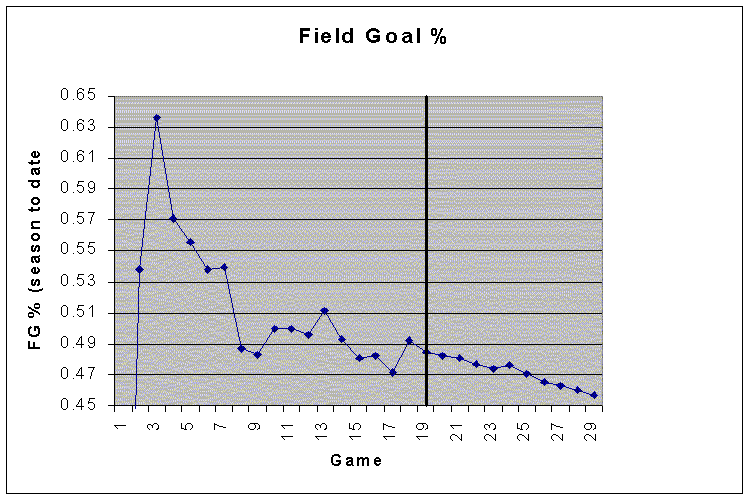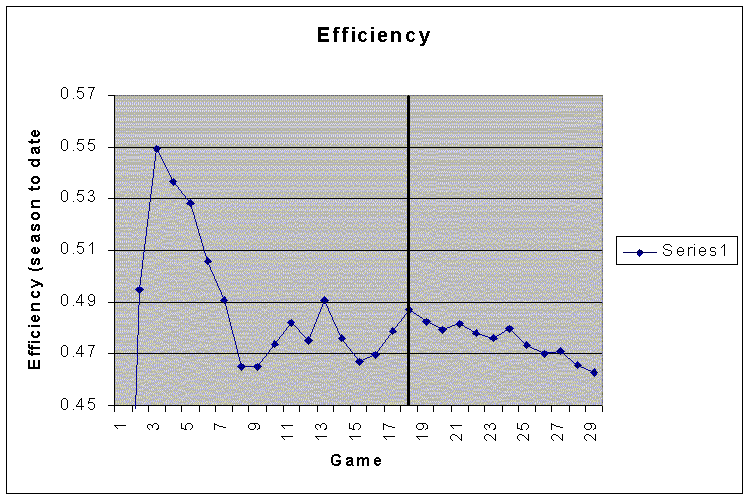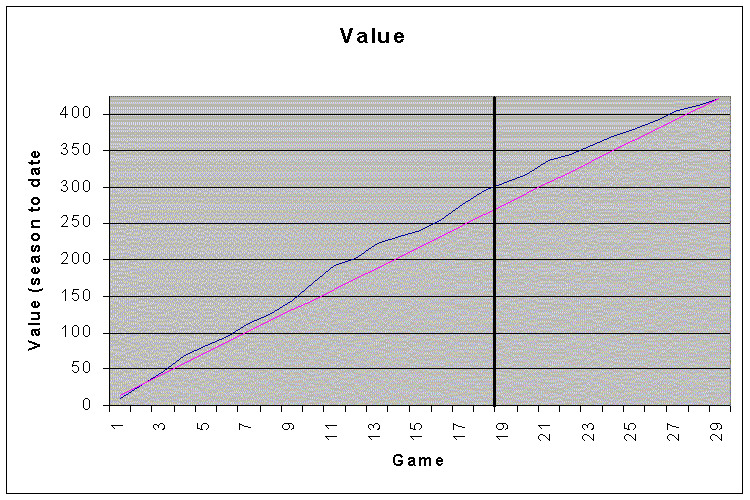Perhaps the most starting development of the early part of the Sonics' 2001-02 campaign was the play of Desmond Mason. Yes, Mason had his moments during his rookie season, including winning the Slam Dunk Championship. He also showed flashes of ability to become a solid jumpshooter. However, when it was all said and done, Mason's rookie campaign was not spectacular by any stretch of the imagination. He shot just 43% from the field, 18 of 67 from beyond the three-point line.
Clearly, Mason's jumper needed to improve if he were to become a starting NBA shooting guard. After all, shooting isn't in the title because it sounded nice.
Over the summer, Mason worked on his jumper, and spent time with former Sonic sharpshooter Dale Ellis in an attempt to improve this facet of his game. According to media reports, Ellis worked primarily on getting Mason to shoot with his fingertips, as opposed to the palm of his right hand.
Some Sonic fans expected Mason to be a markedly improved outside shooter as the result of his off-season work. I was skeptical. Basketball is not osmosis, and great players are often not great teachers. Bill Russell, for example, was not particularly successful in his stint as Sonic head coach. Part of this was, of course, my tendency to assume the worst until contradicted.
Contradicted I was.
The off-season work paid off handsomely, and Mason came out of the chute smoking offensively. His jumper was, indeed, pretty, consistent, and effective. This, in turn, opened up Mason to be less impeded in his attempts to drive the lane.
Early in the season, Mason had improved his field goal percentage to around 50%, an excellent mark for a perimeter player. This enabled him to become a solid starter for the Sonics when injuries struck, and an excellent bench player playing starter's minutes when these others return.
Unfortunately, the injury bug hit Mason too. On December 2, as the Sonics beat the Milwaukee Bucks, Mason was chasing down a loose ball when he collided with the Bucks' Anthony Mason (no relation). It was a play that Mason would often attempt to make, as one of the players attempting to fill the 'hustle' void created by Ruben Patterson's departure, but this time it had disastrous results.
As you can read in my column from the next day, I immediately feared the worst. Mason had been playing with a pulled hamstring that team doctors said might tear, and this was the first thought that came into my mind as Mason lay fairly motionless on the ground. He eventually needed to be carried off the court by teammates Earl Watson and Shammond Williams, unable to make it off the court under his own power.
The last thing any of the 15,000 or so in KeyArena expected was for Mason to return in the next week, let alone that night. Yet that's exactly what happened, as Mason made a Willis Reed-esque (okay, that might be a bit of hyperbole) return to the court. Cleared to play midway through the second quarter, Mason returned. And he did not come out to play at 75%, but instead was perhaps the Sonics' best player in the game, making eight of nine attempts from the field and scoring 16 points.
Two days later, the Sonics announced that Mason had been injured in the fall, and significantly so. He had a sprained knee, which initially was expected to keep him out between a week and two weeks. Mason returned two weeks to the day after his injury, playing 28 minutes as the Sonics handily defeated Orlando.
Mason's absence stretched six games, during which time the Sonics went 1-5, including a season-high four-game losing streak and an embarrassing defeat at the hands of the lowly Miami Heat in KeyArena.
Coincidence or no, Mason's return sparked a Sonic run, as they won their next six games in a row. In the 11 total games since Mason came back, the Sonics are 9-2, as they've revived their playoff hopes and played their best basketball of the season. Yet, amazingly, they've done it with only meager production out of Mason. It's been quite clear to me from watching the games and entering statistics into my Excel spreadsheet for the Stats section of this site that Mason's play has dropped off precipitously.
As usual, however, I need tangible evidence in the form of statistics. ESPN.com is nice enough to provide game logs of each players' production during each game of the season. This enables me to do a number of things statistically. Primarily, I wanted to chart Mason's season-to-date field goal percentage, efficiency (by my rating system) and value (again by my rating system) for each game in which he played.
I've made charts of each of these, and they follow:

At first glance, Mason's field goal percentage appears to be working its way downward throughout the season. However, a downward trend in the early going is mostly due to the fact that he happened to have two particularly good games (6 of 7 and 7 of 9 from the field, respectively) in his second and third games. I don't think we could reasonably have expected Mason to shoot 64% from the field throughout the season, though the Championship Trophy would be in the mail if we could.
Mason's field goal percentage appeared to be settling between 47% and 49% before his injury. His first game back is noted by the black line; starting with this game, his percentage has continually been going down. For the last five games, he's pushed his percentage to new lows, the lowest of the season (excepting his 1 for 6 opening night effort) in each case.
It's quite clear that Mason's shooting has been off since his return; how about the rest of his game?

Mason's efficiency has been more variable throughout the season than his shooting, but again we see a decidedly downward trend.
Value, which is efficiency times minutes, should give us about the same trend, though it should display it differently. Value is almost always going up, because minutes are increasing far faster than efficiency would normally go up. Poorer play would be reflected in a low slope of the line; better with a high slope. Here's the graph:

For comparison's sake, because it's hard to tell what a 'straight' line is, I threw in Mason's average value per game. If he had played equally well in every game this season, he'd achieve the fuchsia line. Instead, we see that Mason was playing far better than average in the early going, building up a 'surplus', so to speak. This surplus was about at its high point when Mason was injured, and has decreased gradually to zero ever since.
These charts provide a pretty good backbone of evidence to demonstrate that Mason's play has been hurt by his injury, but the point is hammered home even more dramatically by a comparison of stats pre- and post-injury:
| fg% | eff | v/g | ppg | |
| before | .492 | .487 | 16.4 | 13.6 |
| after | .384 | .404 | 11.3 | 7.6 |
The evidence is clear all around. Desmond Mason has gone from being an excellent reserve and decent starter to a player who is not deserving of playing time. Whether this is a result of the injury, the layoff, or just a coincidence, I can't say for certain. I don't think, however, that it could possibly just be a coincidence.
Don't take this as a knock against Mason. Much as I appreciate Gary Payton's ability to show up healthy night in and night out for 12 years, I'm not one of those types who takes players to task for their being soft and unable to play through injuries. Injuries are serious stuff, and everyone -- not just the player -- has an interest in their successful rehabilitation.
Additionally, it helps no one if the player is hurting his team by being on the court. Mason's performance now is well below replacement level. I don't wish to disparage his play, but it's clear to me that there are any number of players out there who the Sonics could bring in on a ten-day contract and receive better play from than the post-injury Mason.
One last thought about Desmond Mason. I don't think I'm the only one who's noticed that Mason has become a bit one-dimensional this season. When he's received the ball in a clearout situation, Mason has almost always ended up either taking a shot or turning the ball over, only rarely looking to move the ball to a teammate. As well, his rebounding, solid a year ago, has dropped off significantly. Last season, Mason averaged about 8 boards per 48 minutes. This is a solid amount for a small forward, and excellent for a shooting guard. This year, however, he's dropped to 6 boards per 48 minutes, ahead of only the point guards on the Sonics. I don't, again, have any explanation for this change, but it's there and it's disappointing.
As a statistical measure of offensive one-dimension-ness, I conducted a test to see how much of a players' value (per my formula) was accounted for by his points scored. Here are the rankings:
Desmond Mason - .79
Vin Baker - .782
Rashard Lewis - .758
Peja Drobnjak - .757
Gary Payton - .745
Shammond Williams - .729
Vladimir Radmanovic - .694
Calvin Booth - .69
Brent Barry - .682
Art Long - .628
Earl Watson - .622
Jerome James - .617
Olumide Oyedeji - .534
Antonio Harvey - .493
The fact that Mason's success was so largely predicated on his scoring only increased the effect of his worse shooting since the injury.
| Back to the Candid Corner Archive |
|
Visit Kevin's Column at BskBall.com |
All opinions expressed in this column are solely the views of the author and do not necessarily reflect those of other columnists or staff of Sonicscentral.com
